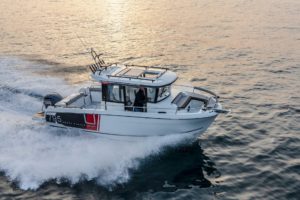Buying your first boat
Buying a boat is an exciting time, and there are many things to consider before making the big purchase. Find out more about what to look out for when buying your first boat.
Contents:
Consider the type of boat you want
You’ve decided that you want to buy a boat, and you know what you want to use it for. There are many different options and specifications available to you, so how do you find the boat that’s right for you?
Once you’ve made a decision on the type of boat you wish to buy, you can further explore the more specific features that you want it to have. The purpose of your boat will change your view on these features. A displacement cruiser and a plaining hull are specified differently, so being aware of the differences will lead you to your decision being correct for you. Thinking about things such as the draft, engine system, propulsion, type of hull, as well as the speed, space and capacity are all factors to inform your final decision of craft.
You may want to consider browsing our
new and
used boats.
How much does it actually cost to buy a boat?
The cost of a boat will vary depending on the type of boat that you opt for, whether it is new or used and the subsequent condition; but it is helpful to have an average to compare to. It may be helpful to look at
this webpage to gain a greater sense of how much your desired boat typically retails for. You can also look at which
boats we have on offer and adjust the filters accordingly.
Consider the continual and long-term costs that follow a purchase. These include licensing, how the boat is powered/fuelled (Petrol or Diesel), where the boat is moored or stored, tow trailers, and any additional repair or maintenance costs.
Are boats a good investment? Do boats hold their value?
Buying a boat is a great investment in personal satisfaction. You cannot really put a price on enjoyment, relaxation, and memory-making; having a boat for these experiences and using a boat on your own terms is invaluable. But it’s worth also considering some different factors that contribute to the value of the boat itself.
When it comes to boat resale value, if there is a future potential to sell your boat, make sure to keep it in the best condition possible. Any minor wear and tear issues must be quickly tended to and resolved before advertising. Most vessels still have a reasonable resale value, and buying a used boat means if you ever decide to resell, you are more likely to make back close to your initial purchase price - these are often as good as new. If you’re uncertain about the long-term use of your boat, you may want to investigate hiring, initially to ensure you enjoy it before committing to the larger investment.
Where to buy a boat?
When purchasing your boat, it is incredibly important that you deal with a reputable seller. Our
brokers can also assist you and provide recommendations to help find the boat that suits your needs. It is vital that the paperwork and or certification is provided with the purchase to avoid complications if you decide to sell or part exchange one day.
This process may differ depending on the boat you are buying (e.g. whether it is new or used), and the broker or dealership you are purchasing from. Typically, you will be required to submit a holding deposit up to 20%, followed by a survey and then a final payment upon the signing of the contract.
What to look for when buying a boat
You’ve thought about the uses you want your boat to achieve and the resulting features it should have. But what else do you need to consider when buying a boat? Here is what you must investigate:
- The condition of the boat
- Documentation
- Test driving the boat
- The survey
- Insurance
- Mooring and storing the boat
- Maintenance
The condition of the boat
Assess its cosmetic and functional condition and explore the inventory of the boat. You should bring along an expert to assist with this process, who can point to any additional underlying or unthought of details.
Look carefully at the structures and mechanics, assess if there is any significant damage (such as from impact), and ask that the gear is safe and up to date. You should also test that everything operates correctly, for example throttle and wheel movement, though this may form part of your test ‘drive’.
Documentation
You must make sure that you have all the right paperwork and information in place. Whilst it is easier to do so for a new boat, used boats must undergo a process which ensures that the boat is CE marked and that any tax liability has been paid (boats of a certain age will be exempt) This process should be carried out by a qualified broker or boat paperwork administrator; if paperwork cannot be provided, then you should question the validity of the sale.
Additional paperwork you must have:
- Builder’s Certificate
- Declaration of Conformity
- A licence - this will depend on the use of your boat
- Proof of Tax Paid
- Bills of Sale
We recommend looking for Brokers that are BMIF or ABYA they have to work to certain standards.
Test ‘drive’
Like buying a car, testing your potential boat is also very important - you need to know that not only does the boat fulfil your requirements on paper, but also on the water. Testing the boat in person will ensure the vessel reaches expectations.
In the UK, you
do not need a boating qualification to be able to buy a boat, nor however to actually use the boat in UK waters. It is advisable and encouraged to book training with an RYA training centre (there is usually one at the boat sales marina). If you are a novice or the boat is a completely different style or size to that which you may have previously owned, booking training, which leads to a qualification results in reductions in insurance premiums. RYA instruction through training encourages and helps build confidence and ability as a Skipper and crew.
Survey
A
survey is important to provide a clear indication of the condition of the boat. It will reveal if there are any issues with the boat that need amending. The owner may carry out these fixes or negotiations on the price may be made.
Insurance
In terms of
insuring your boat, boat insurance should be in place at the time of your final payment - this is the moment at which the boat becomes yours, and having this insurance will help to protect your boat.
You will also then need to think about moorings and storage.
Mooring/storage
Considering where you moor or store your boat is essential in making sure it is well looked after and you can get the most possible out of it. Keeping your boat properly moored or stored will mean you are protecting it as much as possible from other people and extreme weather conditions.
Your mooring setup will be different depending on whether you decide to use your boat locally, inland, coastal or voyage further, even internationally.
If you are to moor your boat locally, you should list all possible mooring locations, visit them in person, and compare their cost, condition, security, accessibility (both by land and water), and its proximity to any locations that you may need to visit for maintenance. You should speak to other boat owners at each site and learn about their experiences using their mooring location.
If you intend to undertake long excursions, you will need to plan a passage to get an understanding of cost and logistics. When will you need to resupply? Where and when will you moor the boat? Conduct research on the mooring options available en-route, or if you need to adapt your journey, options for mooring in alternative locations, re-fuelling points. Passage planning is essential, as is a basic knowledge of Navigation. If you are lacking in this area, RYA training is available with learn at home online courses. Whilst you cannot always visit the moorings in person, you can do in-depth online research, including reading reviews from other users of the moorings and contacting potential marinas.
View our mooring options
here.
Boats on Trailers
Trailer boats are another option, and these can be up to a maximum towing limit of 3.5 tons (including the trailer,) maximum size of twenty six feet in length and a maximum beam of nine feet (for example a
Jeannueau Merry Fisher 795). This option opens a wider range of waters to the owner and allows for home storage: a cost saving on moorings. Alternatively, the boat can be moored in a marina of choice then retrieved from the water and taken on a holiday. It is advisable to look into the boat you wish to buy and check with your boat sales team who will be able to assist on the trailer required if the boat doesn’t already come with one. The craft mentioned in this paragraph (Merry Fisher 795) would require the largest (3.5kg) trailer, preferably with a roller design to make the retrieval and launch easier. Smaller trailerable boats are available too, for instance,
Cap Camarat 5.5 the smallest, up to the 7.5. Before a boat is handed over to a customer, we would fit the boat to your trailer leaving you to enjoy your new boat and ease of trailer operation. Check out the website or enquire to see what we currently have available.
Maintenance
Has the on-board environment been kept safe and tidy, with structures neatly bonded? Are there signs of ongoing repair on specific elements? Get quotes for service and maintenance also research and understand the particular idiosyncrasies of the specific model of boat you are interested in. This should give you a realistic view on the ongoing maintenance costs you can expect to incur. Preventative maintenance is usually cheaper than waiting for something to fail.
If you encounter an issue with your boat, you can explore the
services and repairs we have to offer.
All of these factors will help to ensure your boat is well maintained and looked after. Take good care of your new boat, make memories, and enjoy the ride!
Read about our
Lincoln and
Ipswich Marinas and
book a visit today.


